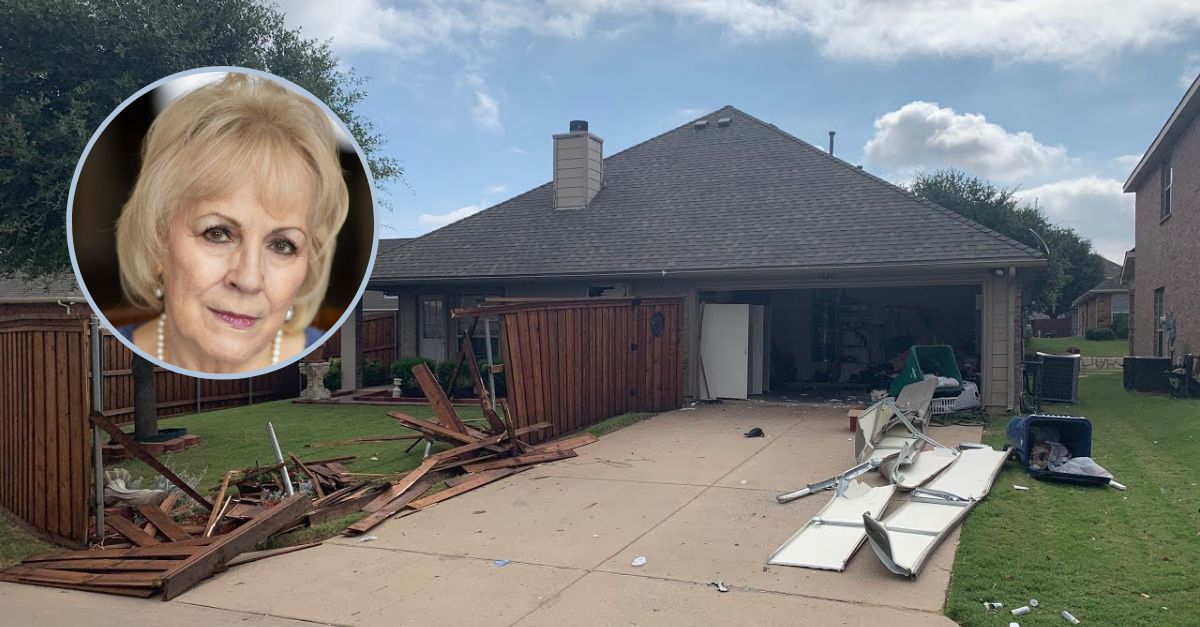
The Texas home of Vicki Baker, inset, was destroyed in a SWAT operation (Institute for Justice).
The Supreme Court justices have declined to weigh in on an appellate court ruling that rejected damages for woman whose home in a Dallas suburb was destroyed by a Texas SWAT team chasing man holding a 15-year-old girl hostage. However, two justices who fall on opposite ends of the political spectrum — Justices Sonia Sotomayor and Neil Gorsuch — disagreed with that decision.
The search for a runaway hostage
On July 25, 2020, a fugitive named Wesley Little kidnapped 15-year-old girl. Little led police in a high-speed car chase, and drove to the home of Vicki Baker while the girl was in Little’s custody. Little had been familiar with the home because he had previously worked there as a handyman. Deanna Cook, Baker’s adult daughter, answered the door. She Little and the girl with him from a posting about Little being on the run with a teen girl earlier that day.
Cook had been on the premises to help her mother ready the home for sale and there was a “For Sale” sign in the yard.
Ultimately, Cook called her mother, who in turn, contacted authorities. When the McKinney police arrived, officers set up a perimeter around the home. Little eventually released the girl, who reported to police that Little was armed, high on methamphetamine, and hiding in the attic. Later, Little told police that he knew he was going to die and planned to have a shoot-out with police.
Police unsuccessfully tried several tactics to get Little out of the home, including launching dozens of tear gas grenades into the house. Eventually, officers detonated explosives, which broke down the front and garage doors, and used a tank-like vehicle to bulldoze the home’s backyard fence. When police entered the house, they found that Little had taken his own life.
Damages and lawsuits
The tactics of police are not part of any dispute in the case, as they have been deemed necessary to prevent harm to themselves and the public. What is at issue, though, is whether Baker is entitled to compensation for the significant damages to her property resulting from the incident. The explosion left Baker’s dog permanently blind and deaf, and a remediation team was necessary clean the toxic gas from the home. Furthermore, ceiling fans, plumbing, floors, and bricks needed to be replaced.
The damage was not covered by Baker’s homeowner’s insurance due to the cause of the damage being deemed an “act of government.” Baker filed a claim for property damage with the city, but the city denied the claim in its entirety.
Baker next filed a federal lawsuit against the city under the Takings Clause of the Fifth Amendment to the U.S. Constitution, which says private property shall not “be taken for public use, without just compensation.” Baker won a judgment of nearly $60,000 for the damages the SWAT team caused to her home. However, the U.S. Court of Appeals for the Fifth Circuit reversed the decision and said police merely did what was necessary to resolve the emergency, and ruling that the Takings Clause does not require compensation for damaged property when it was “objectively necessary for officers to damage or destroy that property in an active emergency to prevent imminent harm to persons.”
SCOTUS refuses to get involved
Baker appealed to the U.S. Supreme Court, but the justices denied certiorari Monday.
Sotomayor and Gorsuch joined forces in a six-page statement on the denial of certiorari in which they said the legality of Takings Clause exception used by the Fifth Circuit “is an important and complex question that would benefit from further percolation in the lower courts prior to this Court’s intervention.”
Sotomayor penned the statement, which she noted “expresses no view on the merits of the decision below.” She explained that she wrote separately to call attention to the “serious question” of whether the Constitution allows government to destroy private property without compensating the owners, “as long as the government had no choice but to do so.” Sotomayor noted that had the city of McKinney destroyed Baker’s home to build a public park, there would have been no question that Baker was entitled to compensation. However, given that the public benefit was protection from harm, Baker has been left to bear consequences alone.
Sotomayor noted that Takings Clause cases have often acknowledged some exceptions, such as property destroyed by war or imminent military action. However, it is an open legal question whether police action such as the capture of Little would fall within recognized exceptions.
“I was hoping the Supreme Court would take up my case, so what happened to me would never happen to anyone else, so it’s disappointing that they decided not to hear it,” said Baker in a statement in response to Monday’s ruling. “If police can destroy my home and leave me with the bill, it can happen to anyone.”
“At some point, the Supreme Court will need to grapple with the fact that there is a circuit split and that the lower courts are divided on this issue,” Baker’s attorney Jeffrey Redfern said in the same statement. “The constitution makes it clear that the government must compensate people for such takings, and your ability to receive such compensation shouldn’t depend on where in the country you live.”
McKinney city officials declined to comment on the case.
You can read the full statement here.
Have a tip we should know? [email protected]





